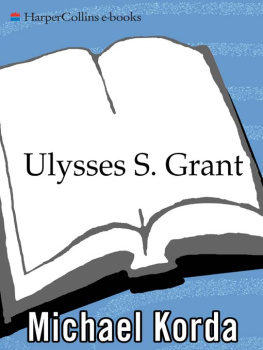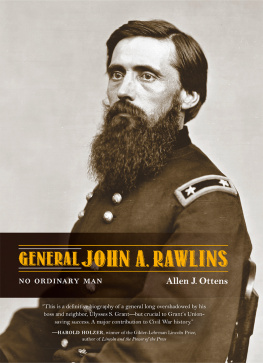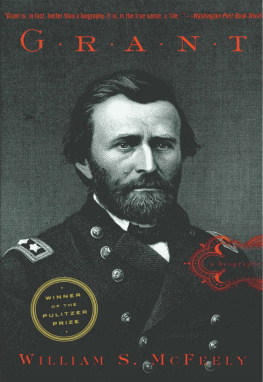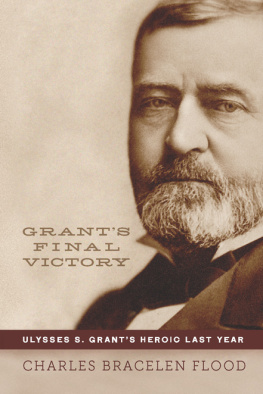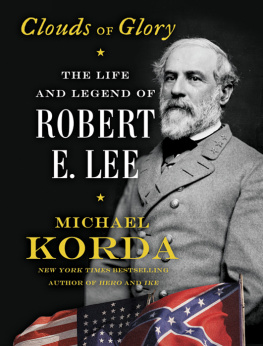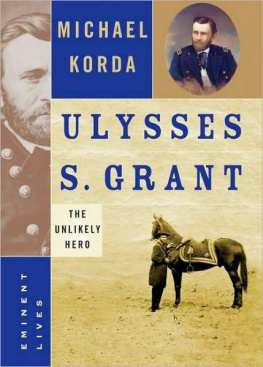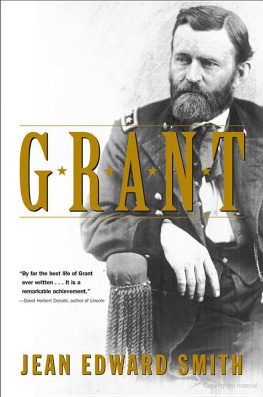I read but few lives of great men because biographers do not, as a rule, tell enough about the formative period of life. What I want to know is what a man did as a boy.
U LYSSES S. G RANT
Eminent Lives, brief biographies by distinguished authors on canonical figures, joins a long tradition in this lively form, from Plutarchs Lives to Vasaris Lives of the Painters, Dr. Johnsons Lives of the Poets to Lytton Stracheys Eminent Victorians . Pairing great subjects with writers known for their strong sensibilities and sharp, lively points of view, the Eminent Lives are ideal introductions designed to appeal to the general reader, the student, and the scholar. To preserve a becoming brevity which excludes everything that is redundant and nothing that is significant, wrote Strachey: That, surely, is the first duty of the biographer.
FORTHCOMING BOOKS IN THE EMINENT LIVES SERIES
Norman F. Cantor on Alexander the Great
Robert Gottlieb on George Balanchine
Paul Johnson on George Washington
Christopher Hitchens on Thomas Jefferson
Edmund Morris on Ludwig van Beethoven
Francine Prose on Caravaggio
Joseph Epstein on Alexis de Tocqueville
Peter Kramer on Sigmund Freud
Karen Armstrong on Muhammad
Bill Bryson on William Shakespeare
GENERAL EDITOR: JAMES ATLAS
I N THE SUMMER OF 2003 Ulysses S. Grant made news all across the country that he had, in his lifetime, done so much to reunite: Some of his descendants, a good part of the more serious press, and the Grant Monument Association objected strongly to pop diva Beyonc Knowles, accompanied by a troupe of barely clad dancers, using his tomb in New York Citys Riverside Park as the background for a raucous, lascivious, nationally televised July Fourth concert.1
Beyonc and her fans hardly seemed aware of who Grant was, or why such a fuss should be made about the presence of loud music, suggestive dancing, partial nudity, and a huge, boisterous crowd in front of his tomb, which, as the New York Times pointed out, had once been a bigger tourist attraction than the Statue of Liberty. In fact, except for a few members of the Grant family who had been trying for years to get the bodies of General Grant and his wife, Julia, removed from the tomb on the grounds that it had been allowed to fall into a disgraceful state of repair and decay, the level of public indignation was low. The Times even felt compelled to comment rather sniffily that the general was no longer the immensely famous figure he once was. Grants great-grandson Chapman Foster Grant, fifty-eight, however, took a different view of Beyoncs concert, commenting, Who knows? If the old guy were alive, he might have liked it.
Knowing as much as we do about the generals relationship with Mrs. Grantlike President Lincoln, whom he much admired, Grant was notoriously devoted to a wife who felt herself and her family to be vastly socially superior to his and was not shy about letting her opinion on the subject be known; and, like Mrs. Lincoln, Mrs. Grants physical charms, such as they may have been, were lost on everybody but her dutiful husbandit seems unlikely that Grant would have allowed himself to appreciate Beyoncs presence at his tomb. Mrs. Grant, it was generally felt, kept her husband on a pretty tight leash when it came to pretty girls, barely clothed or not.
As for Grant himself, while he had his problems with liquorhis reputation as a drinker is perhaps the one thing that most Americans still remember about him, that and the fact that his portrait, with a glum, seedy, withdrawn, and slightly guilty expression, like that of a man with a bad hangover, is on the fifty-dollar billno allegation of any sexual indiscretion blots his record. He reminds one, in fact, of Byrons famous lines about George III:
He had that household virtue, most uncommon,
Of constancy to a bad, ugly woman.
Grant not only led a blameless domestic life, he was the very reverse of flamboyant. Softspoken, given to long silences, taciturn, easily hurt and embarrassed, he was the most unlikely of military heroes. He did not, like Gen. Ambrose Burnside, for example, who was so soundly defeated by Lee at Fredericksburg, lend his name to a style of swashbuckling full sidewhiskerssideburns, as they came to be known after him. Nor did he lend his name, as the unfortunate Gen. Joseph Hooker (who succeeded Burnside and was defeated by Lee at Chancellorsville) was thought to have done, to label the prostitutes who were said to surround his headquarters, so that even today they are still known as hookers by people who have never heard of the general himself. Grant aimed to be the most ordinary appearing and self-effacing of men, and to a very large extent he succeeded.
The fact that Beyonc is black, as was much of the audience of thousands gathered to listen to her concert, might have shocked the general rather less than her near nudity or the lascivious choreography reported by the Times . Grant probably did more than anyone except Lincoln to destroy the institution of slavery in North America, but, like Lincoln, he shared the social attitude toward Negroes of his own race and his time. However, his innate good manners, natural courtesy, and a certain broad-minded tolerance always marked his behavior toward them. It was typical of him that while very few other generals in that age would have had a Native American officer on their staffs, Grant did, and as president he deplored the way in which government agents exploited the Indians, seeming to have felt that Custer got what was coming to him at the Little Big Horn.
Grants personal and professional opinion of Custer had always been low, and although he made more than his share of political and financial mistakes in the White House and afterward, and his judgment of character when it came to civilians was notoriously optimistic, his judgment of generalship was invariably ruthlessly objective and on target. Grant was unsure about a lot of things, but he knew a flashy, incompetent, and reckless general when he saw one, so Custers defeat at the hands of Sitting Bull and Crazy Horse did not surprise or shock him, unlike the rest of the United States.
What he would have made of the Grant familys long struggle to extricate him and Mrs. Grant from Grants Tomb as it fell into disrepair and decay and move them elsewhere is hard to say. One of the reasons the campaign failed was the question of where to put the Grants if they were removed from their tomb in New York City. With that mournful failure of judgment that was apt to come over Grant off the battlefield, he and Mrs. Grant chose New York City for their resting place, in part out of a dislike for Washington, D.C.Grants two terms as president had not produced in either of them any affection for Washington society, nor, in the end, was there much affection in Washington for themwhile Galena, Illinois, which seemed too provincial a backwater in which to bury such a great man, had even fewer happy memories for the Grants than did Washington.

